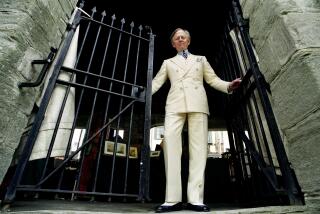A Stretch for Thomas Wolfe : THE GOOD CHILD’S RIVER, <i> By Thomas Wolfe</i> ; <i> edited and with an introduction by Suzanne Stutman (University of North Carolina Press</i> : <i> $21.95; 292 pp.) </i>
- Share via
Thomas Wolfe. Once it was a name that evoked reverent tones among fiction readers, critics and fellow novelists. Even Faulkner allowed that his contemporary from Asheville, N.C., just might be the best writer of his generation. But no more. In academia, Wolfe’s titanic novels have all but vanished from the “canon”--literature regarded as worthy of intensive study. Few novelists today would admit to literary kinship with Thomas Wolfe, who died in 1938. The novels are too amorphous, too undisciplined; the sensibility too absurdly romantic.
Of all his alleged crimes, Wolfe is most often accused of being unable to write about anyone but himself. While false in some particulars, in a broad sense the charge has always been true: By and large, Wolfe’s fiction creates an egocentric universe, and fellow mortals--no matter how vividly rendered--are secondary characters in the drama of the evolution of Thomas Wolfe.
Which is what makes the publication of “The Good Child’s River” a landmark event. On a much larger scale than ever before, Wolfe probes a world beyond his own personal experience or family history. Of all things--for a writer from the small-town South and a male, Protestant writer at that--it’s the world of turn-of-the-century New York City, of young Esther Jack as she grows up in an extended family of Jews and Gentiles.
In large part, this Wolfe we never knew arrives courtesy of Suzanne Stutman, who teaches at Penn State. Stutman, who edited “My Other Loneliness: Letters of Thomas Wolfe and Aline Bernstein,” resolved to edit and publish “The Good Child’s River”--an unfinished novel--in its original form. In her lucid introduction, Stutman notes that approximately 20% of the text has been published previously, cannibalized by Wolfe or his editors for use in both novels and short stories. The majority of “The Good Child’s River”--much of it in three 500-page handwritten leaders--had been languishing for years in the William B. Wisdom Thomas Wolfe Collection at Harvard.
By contemporary standards, “The Good Child’s River” is not so much a novel as it is a rich collection of reminiscences and tableaux, cobbled together by the adult Esther Jack, looking back at her youth. In addition to the eight chapters composing the body of the work, Stutman has appended a series of fragments, many of which Wolfe may have intended to incorporate in the novel. Taken together, the chapters and fragments are an intriguing study in the effort of a notoriously self-involved writer to assume the point of view of another human being.
That person is Aline Bernstein, a prominent New York stage and costume designer whom Wolfe met in 1925. Wolfe was a 24-year-old bachelor and unsuccessful playwright; Bernstein was 44 and married to a New York stockbroker. As the letters in “My Other Loneliness” reveal, Bernstein was the love of Wolfe’s short life, as well as midwife for some of his finest work, most notably “Look Homeward, Angel.” Early in their affair, Bernstein shared with Wolfe--in copious detail--many of the stories and family scenes of her early life. It was from these accounts that Wolfe drew much of the material for “The Good Child’s River.”
The result is an exotic, unique experience for the reader--a literary hybrid in which Wolfe’s voice mingles with Bernstein’s to create Esther Jack. The novel’s best passages are those in which Wolfe’s voice--his hyperbolic prose, his blanket prejudice against Italians, Jews, Irish, WASPS--doesn’t intrude on Bernstein/ Esther’s sensuous, eloquent memories. Here is Esther’s description of her first encounter with a “horseless carriage”: “I can remember now the way that old car looked so well that I could close my eyes and draw it for you. I can remember its rich wine color, its great polished lamps of brass, the door that opened in its round, fat back, and all its wonderful and exciting smells--the strong and comforting smell of its deep leather, and the smells of gasoline and oil and grease that were so strong and pungent that they seemed to give a kind of thrilling life and ecstasy to everything in the whole world.”
In this and many other scenes, Esther Jack is a compelling character--a girl and young woman with an open mind and a clear-eyed passion for life as it comes. Through her eyes, aunts, cousins, schoolmates, her mother and friends of the family come alive vividly--a parade of flawed humanity on the streets of old New York.
Readers who know the other novels will recognize vintage Thomas Wolfe in his portrait of Esther’s father. Bernstein’s real father, Joseph Frankau, was an actor of mixed stock. (His mother had converted to Judaism.) In “The Good Child’s River,” he becomes a character second only in importance to Esther herself--an actor named Joe Barrett, a New England-born Gentile who is forever an exile, among Jews but not of them. Not entirely successfully, Esther’s memories of her father’s friends and performances in the theater marry Wolfe’s own romantic obsessions--with exile, with transience and loss--in the character of Joe Barrett. Perhaps needing a bridge for himself into Bernstein’s world, here Wolfe is the old Wolfe, forfeiting Esther’s unadorned eloquence.
Of her aunt, Bella, Wolfe has Esther say: “When I have spoken of her to people who have never met her, I have found that many would not believe me: Some laughed at me and said I had a romantic temperament, that exaggeration was natural to me, that my memory had thrown a false glow over her, and that such a person as I described had never lived.”
Instead of Esther, this could well be Wolfe himself, addressing an audience of skeptical, post-romantic readers on the subject of his own fiction. But, despite its flaws, “The Good Child’s River” is a reminder of Wolfe’s prodigious ambition as a writer. At the same time, it suggests that we have underestimated the range of his talent. This “found” novel is a mind-opening expansion of the world according to Thomas Wolfe.
More to Read
Sign up for our Book Club newsletter
Get the latest news, events and more from the Los Angeles Times Book Club, and help us get L.A. reading and talking.
You may occasionally receive promotional content from the Los Angeles Times.










